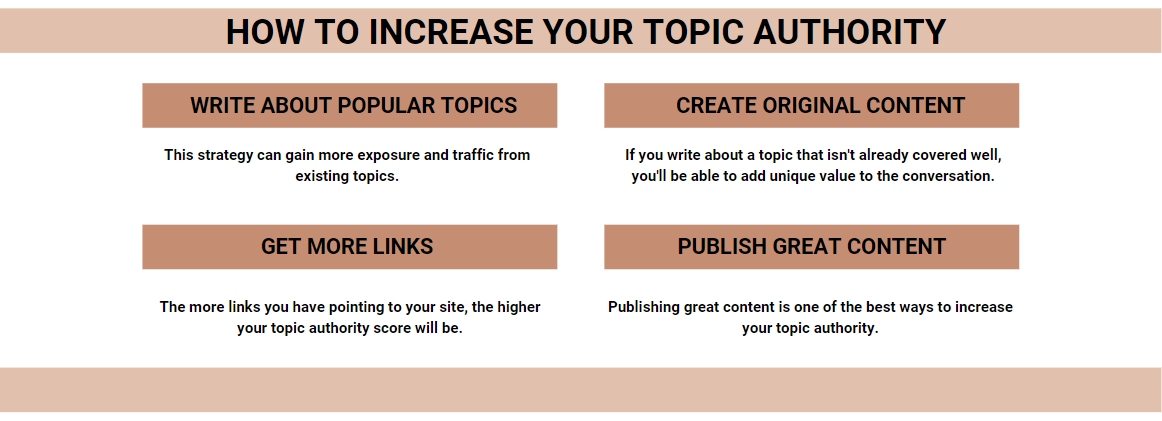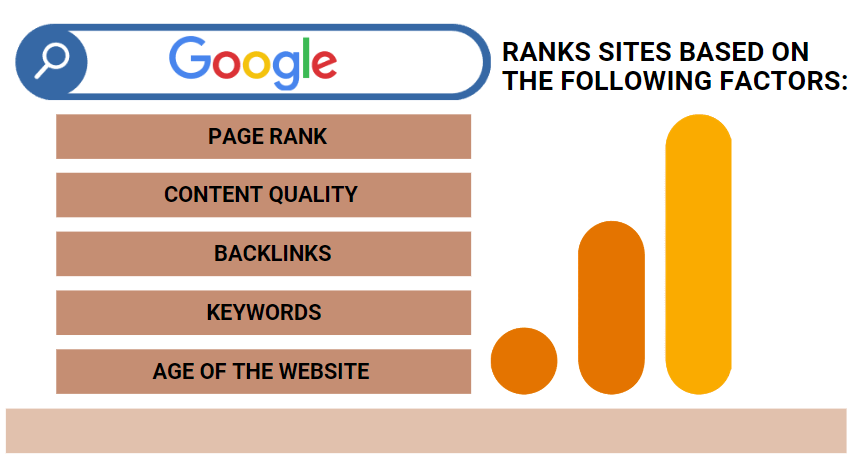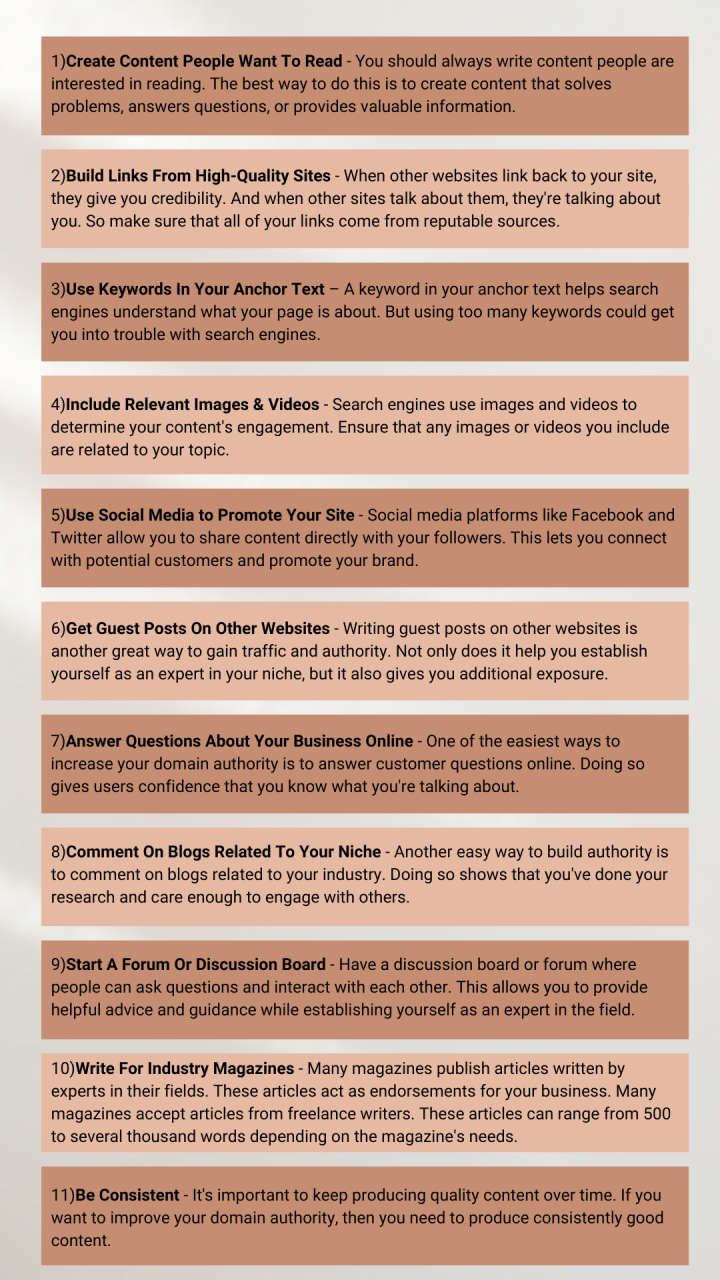A topical authority measures the breadth of knowledge on a topic, while a domain authority measures a site's authority for its specific domain name.
The more topics you write about, the higher your overall topic authority will be. The more authoritative your posts are, the more likely they rank well in search results. In this article we will cover the following:
Table of Content:
- What is 'topic authority'?
- Why is authority important in SEO?
- What Contributes to Topical Authority?
- How to Increase Topic Authority?
- How does Topical Authority Help You Rank Higher?
- Why Choose Topics Over Keywords for SEO?
- What is Domain Authority?
- What is the difference between Topic Authority and Domain Authority?
- How is Topic Authority Related to Domain Authority?
- How can authoritative backlinks help build your site s authority and improve your SEO ranks?
- How can we, as an SEO Agency, help you build Topic Authority?
An excellent way to gauge your topic authority is by looking at the number of unique topics you've written about. If you have a lot of experience writing about one or two topics, it may indicate that you know what you're talking about when it comes to those topics. However, if you're only familiar with a few topics, it could mean that you need to expand your horizons and learn more about other subjects.
To improve your topic authority, start expanding your knowledge base. Authority is important because it helps determine where your content ranks in search engine result pages (SERPs). It also affects whether or not someone clicks through to read your post.
To increase your topic authority, you should focus on creating high-quality content that answers questions related to your niche.
This will help you become an expert in your field and attract new customers to your website.
Authority is critical in determining which websites get ranked first in SERP results. Creating content relevant to your audience can build up your brand as an industry leader.

What is 'topic authority'?
Topic authority is a metric used to evaluate the quality of a particular topic. It's calculated based on the number of times a given topic has been discussed on social media sites like Twitter and Facebook.
It's similar to the concept of "domain authority", but instead of measuring the authority of a single website, it measures the authority of a topic across multiple websites.
Why is authority important in SEO?
Authority is a key factor that determines the ranking of your website on search engines like Google, Yahoo or Bing. It's also an essential part of building trust with visitors. If you want to rank higher on search results pages (SERPs), you need to build up your domain authority.
The more authoritative your site appears, the better it will be ranked by search engines. If you have a high-authority site, you can expect your business to appear at the top of SERPs for relevant keywords.
What Contributes to Topical Authority?
Each page has its authority ranking that can contribute to the overall topic authority score. You gain topical authority by publishing great content on your blog.
A topical authority is measured using a formula that considers the number of links pointing back to your site from other websites. Your link profile is a significant contributor to your topical authority.
The type and structure of the content you create also contribute to your topical authority.
How to Increase Topic Authority?
When you create original content, you can provide value to readers who might otherwise find themselves searching for information elsewhere.
However, the overall topic authority score includes all these rankings together. Even though the page on the less popular blog has a lower individual authority rating, it still contributes to the overall topic authority.

To increase your topic authority, ensure you're posting regularly about your topic. You'll notice that some topics tend to trend over time, while others don't. Quality content makes people come back to your site again and again.
How does Topical Authority Help You Rank Higher?
You may not realize it, but Google uses topical authority when calculating your pages' importance in search results.
Google considers your topically authoritative pages more likely to contain valuable content than those with low topical authority. This means they rank higher in search results.
To improve your organic search ranking, you must publish content that provides value to your target audience.
By creating high-quality content, you're helping Google understand which pages are most relevant to your audience.
This helps Google determine which pages should appear at the top search results.
In addition, publishing highly topical content will help Google understand which topics are trending right now.
By understanding what people are looking for, you can better serve them through your content.
Why Choose Topics Over Keywords for SEO?

Topics are more potent than keywords because topics have context. They tell Google exactly what your website is about. Topics are often found at the beginning of a sentence or phrase.
For example: "How to start a blog" is a topic. But "how to create a blog" is not a topic. The second one tells Google you're writing about blogging, which is much less helpful information.
The same goes for keyword phrases. When someone searches for "blogging tips", they don't necessarily mean they want to learn how to start a blog. They may be looking for general blogging tips.
So, when you write your content, focus on topics instead of keywords.
Suggested Read: Why Should You Use Pillar Page in your SEO Strategy?
What is Domain Authority?
Domain Authority (DA), sometimes called Web Authority, is a metric used by Google to rank web pages. It's calculated based on the number and quality of backlinks pointing to a site. Domain Authority is measured on a scale of 0-100. Higher scores indicate better rankings.
Google uses Domain Authority to determine how trustworthy a page is. In turn, this affects which search results appear on SERPs.
Why is domain authority important, and why should you care?
- Because Domain Authority is a ranking factor, it directly impacts your organic search engine optimization (SEO).
- Higher Domain Authority Better Organic Search Engine Optimization
- A higher Domain Authority indicates that a website is more trusted than another. It increases the likelihood that searchers will click through to that site.
- A lower Domain Authority indicates that a site is less trusted than another. As a result, it decreases the chances that searchers will click through to that site.
- A site's Domain Authority measures how well-known the site is within the search engines. Higher DA scores indicate better rankings.
Google uses Domain Authority to rank sites.
What is the difference between Topic Authority and Domain Authority?
The main difference between Topic Authority and DA is that Topic Authority focuses on measuring the popularity of a topic. In contrast, Domain Authority focuses on measuring the reputation of a site.
How is Topic Authority Related to Domain Authority?






